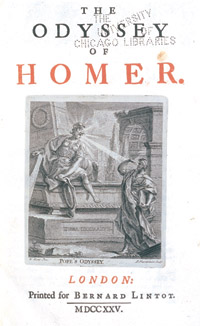Page-turners
>>
Found
in the Translations
Paul
Friedrich walks into the room, takes off his coat, looks up at
the class, and says, "Well, let's get right to it."
He opens one of a stack of texts he carried in under his arm,
books so well-worn that, had there not been so many of them, one
would swear he keeps them in his pocket all day for those moments
of extra reading time at the bus stop.
 The
course, Homeric Vision/Western Muse, is one of Friedrich's own
design, offered by the humanities and anthropology departments
as well as the Committee on Social Thought. Friedrich, professor
emeritus in anthropology and linguistics and the Committee on
Social Thought, assembles the class every other Thursday in a
small room in Harper to pore over the core text for the course,
Homer's Odyssey.
The
course, Homeric Vision/Western Muse, is one of Friedrich's own
design, offered by the humanities and anthropology departments
as well as the Committee on Social Thought. Friedrich, professor
emeritus in anthropology and linguistics and the Committee on
Social Thought, assembles the class every other Thursday in a
small room in Harper to pore over the core text for the course,
Homer's Odyssey.
Rather
than start with an overview of the course or an introduction to
Homer, Friedrich reads the opening paragraph of an Odyssey
translation by the 17th-century classicist George Chapman:
The
Man, O Muse, informe, that many a way
Wound with his wisedome to his wished stay;
That wanderd wondrous farre when He the towne
Of sacred Troy had sackt and shiverd downe.
"What
strikes you about Chapman's translation?" Friedrich asks,
trying to hide the grin that reveals how deeply he loves Homer's
monumental work.
A
social-thought student points out Chapman's heavy use of alliteration,
demonstrated in the opening line. Friedrich smiles and repeats
the words to prove the student's point, curling his lips over
the ms and ws for effect. "Also, Chapman's
verse is written in rhymed couplets," he says, "which
Chapman felt was the English-literature analog to the dactylic
hexameter in which the original Odyssey was written."
Friedrich
follows Chapman with Alexander Pope's early 18th-century translation
of the same sentences:
The
man, for wisdom's various arts renown'd,
Long exercised in woes, oh Muse! resound.
Who, when his arms had wrought the destined fall
Of scared Troy, and razed her heaven-built wall,
Wandering from clime to clime, observant stray'd,
Their manners noted, and their states surveyed.
Although
Chapman and Pope were both English and lived only 100 years apart,
there is a palpable difference in style between the two. "You
have Chapman in the middle of the English Renaissance, his ebullient
use of language," says Friedrich, "and Pope right in
the middle of the English neo-classical period, locked into the
Latin and Greek and very much concerned with tight form."
This
is how Friedrich's course earns its title. Rather than sticking
with a single standard translation by Fagle, Fitzgerald, or Lattimore,
the class reads several translations of a specific passage to
gain an appreciation of how different authors have translated
Homer throughout the centuries and how Homer's epic has influenced
other works.
By
the end of the first class the students-who range from undergrads
to advanced Ph.D. candidates in social thought-are offering their
own interpretations of the differences between translations, ranging
from the poetic license of T. E. Lawrence's prose rendition to
the dry, academic manner of Plato's one-paragraph summary. Over
the course of the semester, they also investigate works of other
authors-among them Tolstoy, Tennyson, Virgil, and Dante-whose
writings have been influenced by Homer in the 27 centuries since
the Odyssey first emerged from the oral tradition and entered
the realm of the written word.-C.S.
Found
in the Translations
The
Soul of the Republic
Travels
with a Satirist
Ocean
Reveries
The
Genius of the Everyday

![]()
 The
course, Homeric Vision/Western Muse, is one of Friedrich's own
design, offered by the humanities and anthropology departments
as well as the Committee on Social Thought. Friedrich, professor
emeritus in anthropology and linguistics and the Committee on
Social Thought, assembles the class every other Thursday in a
small room in Harper to pore over the core text for the course,
Homer's Odyssey.
The
course, Homeric Vision/Western Muse, is one of Friedrich's own
design, offered by the humanities and anthropology departments
as well as the Committee on Social Thought. Friedrich, professor
emeritus in anthropology and linguistics and the Committee on
Social Thought, assembles the class every other Thursday in a
small room in Harper to pore over the core text for the course,
Homer's Odyssey.